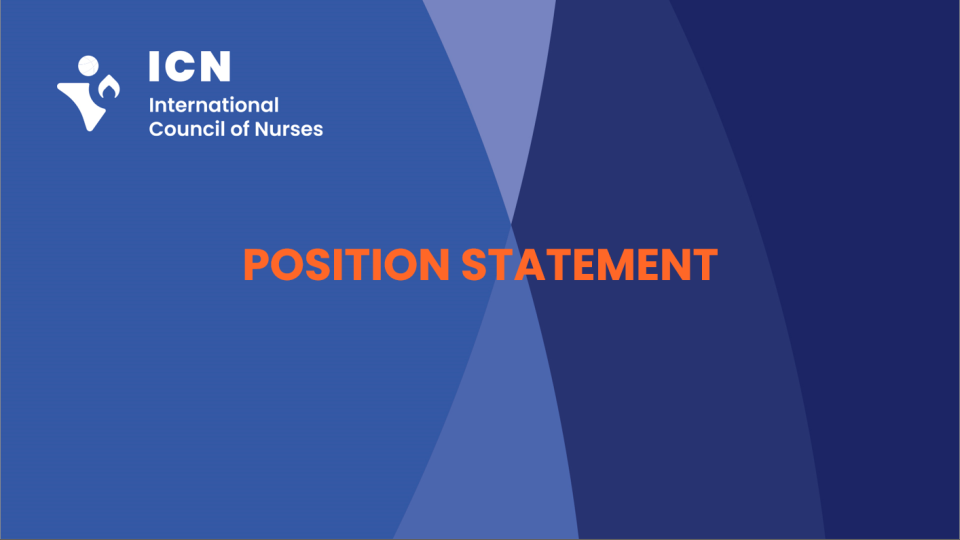Health inequities and discrimination – new ICN’s position statement addresses role of nurses

“To ensure health equity is to ensure that everyone has the same opportunity to be healthy no matter who they are, where they live or what they do.”
The International Council of Nurses (ICN) recently released a new position statement on health inequities, discrimination and the nurse’s role.
Presenting a brief overview of the ways in which inequities and discrimination intersect with health and affect the health of all persons across the globe, the new position statement describes how experiences of discrimination, racism and historical trauma are important social determinants of health inequities for certain groups of people, such as LGBTQ+, indigenous peoples, people of colour, women and gender minorities, people with disabilities, and older persons.
ICN CEO Howard Catton said,
“The pandemic exposed existing inequalities in health and now we are experiencing widening inequalities in terms of access to health care and key outcome indicators. Numerous studies , have shown that the pandemic has exacerbated health inequalities, for example higher mortality rates occurred among older people, people from certain ethnic backgrounds, disabled people, and those living in areas of socioeconomic disadvantage.”
The World Health Organization has reported that, “Inequalities in the social determinants of health have been unmasked by the COVID-19 pandemic, and have led to glaring inequities in COVID-19 health outcomes between population groups...In turn, the broader impacts of the COVID-19 pandemic have unequally impacted on the social determinants of health themselves, further exacerbating health inequities.” This causes major risks to the achievement of the Sustainable Development Goals and Universal Health Coverage.
As the largest group of health professionals, and the most trusted, nurses are in a powerful position to directly act to dismantle and transform structural discrimination in health care. As indicated in the ICN Code of Ethics for Nurses, nurses have a professional duty to advocate for equity and social justice and a shared responsibility for initiating and supporting action to meet the health and social needs of the public, in particular those of vulnerable populations.
The new position statement also advocates for nurse-led care innovations which offer solutions that meet the needs of people and address health inequities by being non-discriminatory, accessible, appropriate, and person-centred.
As well as stating ICN’s position on the nursing role in addressing health inequities and discrimination, the position statement also addresses the actions national nursing associations (NNAs) can take in collaboration with their respective governments. These include:
- Advocating for action to make non-discrimination and anti-racism foundational to the core values and operations of health systems, healthcare organizations and employers;
- Leading and supporting the nursing profession to work to dismantle discriminatory and oppressive health and social systems;
- Advocating for a diverse nursing workforce and nursing leadership;
- Working with governments and institutions to make meaningful, effective and enduring policy changes to achieve justice and health for all;
- Advocating for health systems that are designed to promote equity, reduce inequalities and address systemic discrimination;
- Advocating for policies in all sectors that address the social determinants of health and changes in social and political norms;
- Supporting community participation and community empowerment to harness the strength and resilience of communities;
- Working to ensure all nurses have basic competencies and training on providing culturally competent care.
ICN also called on individual nurses to:
- Promote an environment in which the human rights, values, personal choices, customs and spiritual beliefs of individuals, families and communities are respected;
- Work to protect, celebrate and promote the diversity of all persons to eliminate discrimination;
- Speak out in the face of injustice; and
- Look inwards and challenge their own privilege, assumptions and biases in order to provide care that truly meets the needs of the populations they serve.
ICN’s position statements address a variety of areas related to health, well-being and nursing professional advancement. All position statements can be found here.
BMA (7 July 2023). The impact of the pandemic on population health and health inequalities. Available at: https://www.bma.org.uk/advice-and-support/covid-19/what-the-bma-is-doing/the-impact-of-the-pandemic-on-population-health-and-health-inequalities
McGowan, VJ and Bambra, C. (November 2022). COVID-19 mortality and deprivation: pandemic, syndemic, and endemic health inequalities. The Lancet, Vol. 7, Issue 11, Available at: https://www.thelancet.com/journals/lanpub/article/PIIS2468-2667(22)00223-7/fulltext World Health Organization (October 2021). COVID-19 and the social determinants of health and health equity: evidence brief.